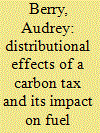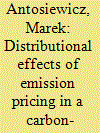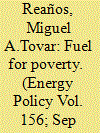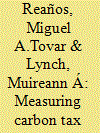| Srl | Item |
| 1 |
ID:
162902


|
|
|
|
|
| Summary/Abstract |
This paper studies the distributional effects of France's recently introduced carbon tax. Using a microsimulation model built on a representative sample of the French population from 2012, it simulates the taxes levied on each household's consumption of energy for housing and transport. Without revenue recycling, the carbon tax is regressive and increases fuel poverty. From a policy perspective, this finding indicates that the question of fuel poverty cannot be ignored in the quest for a fair ecological transition. It proposes that some of the revenues from the carbon tax should be redistributed to households. Different designs of cash transfer to support households are then compared. The results show that the inequities of the carbon tax could be offset at reasonable cost relative to total carbon tax revenues. However, adjusting the design of cash transfers to criteria other than income level does not diminish the cost of compensating households. The benefits of finely adjusting cash transfers may therefore be somewhat limited. Most notably, the results show that targeting revenue recycling at low-income households would help to reduce fuel poverty substantially. This study therefore indicates that carbon taxation actually provides an opportunity to finance ambitious policies to fight fuel poverty.
|
|
|
|
|
|
|
|
|
|
|
|
|
|
|
|
| 2 |
ID:
183053


|
|
|
|
|
| Summary/Abstract |
We assess the distributional impact of introducing a carbon tax in a small open economy, using the case of Poland. We use a dynamic general equilibrium model with a search mechanism in the labour market, soft-linked to a microsimulation model based on household budget survey data. We evaluate the impact on various income groups and on inequality. We account for four key channels: the direct (energy) and indirect (other goods) price effects, behavioural adjustment of consumption, and changes in labour income. We consider three of ways to recycle the carbon tax revenue: lump-sum transfer, energy price subsidies, and labour tax reduction. We find that the distributional effects depend on the recycling of revenues. Using them to reduce labor taxation attenuates the negative effect of carbon tax on GDP and employment but increases inequality compared to a lump-sum transfer to households. This finding highlights the trade-off between efficiency and equity. Our results could be relevant for other countries producing fossil fuels, such as South Africa, Germany, or Australia.
|
|
|
|
|
|
|
|
|
|
|
|
|
|
|
|
| 3 |
ID:
179710


|
|
|
|
|
| Summary/Abstract |
A new approach rooted in economic theory is proposed to analyse the relationship between fuel poverty and income poverty using self-reported data. The model shows that neglecting the overlap between income and fuel poverty underestimates the metrics for the change in income poverty due to increases in carbon taxes. The model is parametrized using econometric methods. Being a single adult with dependent children, having low education levels, low income levels and having darkness or dampness in the dwelling increases the probability of being fuel poor. The estimates show that an 1% increase in carbon taxes will raise the number of people experiencing fuel poverty by 0.5%. It is also shown that while increases in lump-sum transfers are progressive, increases in energy prices and energy required to heat a dwelling are regressive. Among poor households, fuel poor households have the lowest income levels, have issues with dampness, and it is less likely that they have double glazing in their dwellings compared to other income poor households. Income and fuel poverty are two distinctive problems that require different policy instruments. Policies need to address income and energy efficiency inequalities simultaneously to counteract the regressive effect of carbon taxes in Ireland.
|
|
|
|
|
|
|
|
|
|
|
|
|
|
|
|
| 4 |
ID:
182577


|
|
|
|
|
| Summary/Abstract |
Chinese migrant workers are very exposed to the shocks caused by the COVID-19 pandemic. Falling remittances adversely affect their families who rely on remittance incomes. The impacts of COVID-19 on migrants and remittance-receiving households are assessed using a nationally representative household dataset and a microsimulation model. We found about 70 percent of migrant workers lost part of their wage income during the pandemic lockdown period and rural migrants working in small and medium enterprises were affected the most. This led to about 50 percent of remittance-receiving households being affected adversely by falling remittances, and the average decline in such income was more than 45 percent. Nearly 13 percent of pre-pandemic nonpoor remittance-receiving households could fall into poverty, raising the poverty rate among remittance-receiving households by 4 percentage points. Many households that were poor prior to the pandemic became more impoverished. The results indicate that social protection programs targeting vulnerable migrants and their families at home are important.
|
|
|
|
|
|
|
|
|
|
|
|
|
|
|
|
| 5 |
ID:
183057


|
|
|
|
|
| Summary/Abstract |
We quantify the vertical (i.e. between income differences) and horizontal (i.e. within income differences) distributional effects of carbon taxation using a fully flexible demand system and Irish data. The model avoids imposing the curvature of the relationship between income and energy demand. We show that neglecting this fact can lead to misleading policy conclusions. We also show that losses in purchase power are the main channel of welfare losses. Losses due to limitations for energy substitution play a minor role. We found that rural households and householders in retirement age are the most affected by carbon taxation. Regarding horizontal effects, we show that higher heterogeneity in the tax burden is experienced by couples with dependent children and those in urban households. These findings highlight the importance of quantifying both horizontal and vertical distributional effects when designing carbon taxes and revenue recycling mechanisms. Within distributional effects are larger than between distributional effects regarding income inequality of the tax and revenue recycling mechanisms. We found that a targeted transfer is preferred over a lump-sum transfer in reducing welfare losses caused by the regressivity of taxation. These findings hold when measuring both horizontal and vertical distributional effects.
|
|
|
|
|
|
|
|
|
|
|
|
|
|
|
|